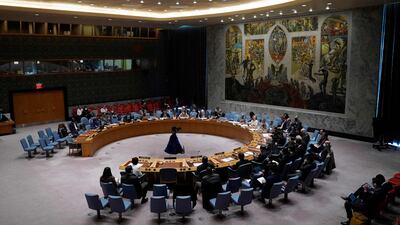Live updates: follow the latest news on Russia-Ukraine
As financial shocks go, last week will go down in history.
Last Wednesday’s expulsion of Russia from the MSCI Emerging Markets Index — a benchmark for trillions of dollars in investment funds — was the coup de grace.
Russia has been usurped as the leading oil play in emerging markets by the combined markets of the GCC. For the 24 countries spanning the three regions left in the MSCI Emerging Markets Index, this triggered an immediate rebalancing.
While index compilers have dropped countries from key indexes before — most recently Pakistan and Argentina in 2021 — this is usually after months of deliberation.
The speed of Russia’s removal has immediate implications — money flowing into index-tracking funds will no longer go to Russia. Instead, a higher share will go into GCC stocks.
The outcome was that GCC countries, led by Saudi Arabia, now account for 7.6 per cent of the influential index. Five years ago, the region constituted only 1.6 per cent while Russia accounted for 3.9 per cent.

The reweighting reflects a changing global financial landscape. GCC markets have become far more investor-friendly in the past five years, with Saudi Arabia and Kuwait gaining EM status even as the bar for EM entry rose.
As a group, the GCC is now one of the most exciting, dynamic emerging markets as it continues to diversify away from an energy-price driven economy.
Meanwhile, GCC dollar currency pegs free investors from worrying about foreign exchange devaluation. EM investors who previously overlooked the GCC region — too small, too rich, too commodity-dependent — are now looking at these countries with a new set of eyes.
At EFG Hermes’ fifth Virtual Investor Conference last week, three core themes emerged.
First, the commodity conversation. Rocketing prices are triggering a cost-of-living crisis across the world, but are also creating windfalls for GCC governments that were squeezed by successive oil price collapses in 2014 and 2020.
Consumer companies in the GCC and across Frontier Emerging Markets pointed to the impact that rising inflation is having on disposable incomes, as well as the disruption that Covid-19 and now the Russia-Ukraine crisis is bringing to global supply chains.
Economies face the double whammy of corporates raising prices while interest rate rises loom large on the horizon.
For some lower-income countries, there is an immediate impact from the conflict in Eastern Europe. Take wheat, where Russia and Ukraine are, respectively, the biggest and fifth-biggest exporters in the world.
Egypt, the world’s largest wheat importer, receives 86 per cent of its supplies from these two countries. With Black Sea shipments currently halted, Egypt is being forced to tear up its budget assumptions for subsidies as wheat futures markets flirt with $400 a tonne.
This explains why the price of unsubsidised bread rose by 50 per cent in Egyptian shops last week.
Bangladesh and Pakistan are also major importers of food and energy, and they will struggle to finance the widening gap.
Meanwhile, GCC countries face a challenge that other countries would love to have — sticking to their plans to diversify their economies away from oil, rather than spending this year’s oil windfall.
GCC countries also face the challenge of managing energy supply at a time of political uncertainty — they want to keep the Opec+ system alive, but they do not want oil prices to rise to levels where demand is destroyed.
Costlier crude is a double-edged sword for many frontier emerging markets outside the GCC. Headline inflation is rising, affecting food and fuel prices globally, but healthier GCC economies can mean foreign workers in the Gulf sending more money back to cities and villages in Egypt, Pakistan, Bangladesh and the Philippines.
What was also evident to investors are the bright growth prospects in Africa. The continent’s growth story is not limited to commodities, but in many cases the increases in prices will help.
The continent has more than one quarter of the world’s arable land. Eleven of its countries rank among the top 10 sources for at least one major mineral. Properly harnessed, the money from a commodity price boom can feed longer growing trends of millions of Africans entering the consumer goods market, where opportunities are being created in many sectors from banking to telecoms.
Thirdly, world events are creating new trade routes and opportunities for services exporters in many countries.
Driven by its strong education base, Ukraine is well-known in Europe as a technology powerhouse and a key provider of information technology outsourcing services. Russia and Belarus have also been important centres for similar industries.
For many years, entrepreneurs opening technology businesses looked no further than Ukraine, Russia and Belarus for their back and middle office support infrastructure.
The Russia-Ukraine crisis has forced businesses to pivot away from these mainstays of the global IT services market, creating opportunities for companies in Morocco, Egypt, Pakistan and Vietnam among others.
The MSCI Emerging Markets Index has reflected major shifts in the world economy since it was launched in January 2001.
In recent years, the GCC economies have come of age, displacing Russia, an index veteran, as the best play on rising oil prices. Opportunities prevail even when markets are in turmoil.
Simon Kitchen is managing director and head of strategy at EFG Hermes Research































